How to Choose an ENT Over a General Practitioner for Chronic Issues
How to Choose an ENT Over a General Practitioner for Chronic Issues
Blog Article
Checking out the Area of Otolaryngology: What to Anticipate When You Get In Touch With an ENT
Otolaryngology, generally referred to as ENT, encompasses the medical diagnosis and therapy of nose, throat, and ear conditions. For those experiencing associated concerns, speaking with an ENT specialist can provide quality and relief. Comprehending what to anticipate throughout such assessments is important for effective interaction and care. This overview will certainly lay out vital elements of the ENT experience, including usual reasons for gos to and the procedures entailed in diagnosis and therapy.

Understanding Otolaryngology: An Introduction
Otolaryngology, frequently described as ENT (Nose, ear, and throat) medication, is a specialized branch of medication that concentrates on the medical diagnosis and therapy of conditions impacting these crucial areas of the body. This area includes a variety of disorders, consisting of those pertaining to hearing, equilibrium, respiratory feature, and speech. Otolaryngologists are trained to handle both medical and medical therapies, utilizing advanced methods and modern technologies. Their competence expands past conventional conditions, resolving concerns such as allergies, sinus infections, and hearing loss. Additionally, they play an essential role in the management of head and neck cancers, offering detailed care tailored to individual patient requirements. Generally, otolaryngology stays crucial for keeping wellness and lifestyle in affected individuals.
Typical Reasons to See an ENT Expert
Several people seek the competence of an ENT specialist for a variety of factors, mirroring the diverse nature of conditions that affect the ear, throat, and nose. Common concerns include persistent sinusitis, which often brings about consistent nasal blockage and facial discomfort. Allergic reactions and their connected signs, such as sneezing and itching, likewise prompt visits to these specialists (Voice). Hearing loss, whether unexpected or gradual, is another considerable reason for examination. Additionally, people might seek analysis for throat disorders, consisting of persistent hoarseness or ingesting difficulties. Sleep apnea, identified by disturbed breathing during rest, is frequently dealt with by ENT professionals as well. Each of these problems highlights the relevance of specialized care in handling complicated ENT-related wellness issues
Getting ready for Your ENT Consultation
When preparing for an ENT visit, it is vital to collect relevant information and consider any type of certain problems. Patients must assemble a comprehensive clinical background, consisting of previous ear, nose, or throat concerns, surgical procedures, and current medications. Recording symptoms-- such as regularity, intensity, and period-- can provide important understandings for the ENT professional. In addition, people should prepare a checklist of questions they wish to ask, making sure that all worries are resolved throughout the visit. Bringing along any appropriate medical records or test results can further assist the ENT in understanding the person's condition. Finally, patients should confirm their consultation information, consisting of place, time, and date, to reduce any type of last-minute confusion. Correct preparation can boost the efficiency of the assessment and bring about far better outcomes.
What to Expect Throughout the Consultation
As the appointment begins, the person can expect to involve in a complete discussion with the ENT professional about their signs and medical background. The expert will certainly ask about the period, frequency, and extent of symptoms such as hearing loss, nasal blockage, or aching throat. Additionally, the individual's previous clinical conditions, medicines, and any kind of relevant family background will certainly be assessed, aiding the expert in developing a total understanding of the individual's wellness. The ENT may also ask about way of living variables, such as exposure to irritants or irritants. This open dialogue develops a foundation for the assessment, guaranteeing that the patient's worries are attended to and setting the phase for any required examinations or referrals for therapy.
Diagnostic Examinations and Treatments in Otolaryngology
A series of diagnostic examinations and treatments are important in otolaryngology to properly evaluate and identify conditions influencing the nose, ear, and throat. Usual tests include audiometry, which gauges hearing function, and tympanometry, evaluating center ear pressure. Nasal endoscopy permits visualization of the nasal passages and sinuses, while laryngoscopy analyzes the throat and singing cables. Imaging strategies, such as CT scans and MRIs, offer in-depth sights of head and neck structures. Allergic reaction screening may additionally be conducted to identify triggers for sinus or respiratory issues. These diagnostic tools make it possible for ENT specialists to establish a complete understanding of individuals' problems, guaranteeing tailored and reliable monitoring plans. Appropriate medical diagnosis is crucial for successful treatment end results in otolaryngology.
Treatment Choices Offered by ENT Specialists
ENT specialists provide a selection of therapy options customized to deal with specific problems impacting the nose, throat, and ear. These you could try here treatments range from traditional strategies, such as medication and way of life modifications, to more invasive treatments. For instance, allergies might be taken care of with antihistamines or immunotherapy, while chronic sinusitis may require nasal corticosteroids or sinus surgical treatment. For hearing loss, ENT experts usually suggest listening devices or medical interventions like cochlear implants. In situations of throat disorders, choices can include speech therapy or operations to get rid of obstructions. Furthermore, they might offer assistance for managing rest apnea, consisting of the usage of CPAP gadgets or surgical treatments. Overall, the goal is to improve people' lifestyle with individualized care and reliable treatment methods.
When to Look For Follow-Up Care With an ENT
Acknowledging when to seek follow-up care with an ENT professional is vital for managing continuous signs or problems associated with ear, throat, and nose problems. Patients must take into consideration arranging a follow-up visit if symptoms persist despite preliminary therapy, such as persistent ear discomfort, nasal congestion, or throat discomfort. Modifications in hearing, equilibrium problems, or uncommon nasal discharge might additionally call for additional evaluation. In addition, if a person experiences side impacts from recommended medications or his explanation has undergone a surgery, follow-up treatment is essential to keep an eye on healing and resolve any type of worries. Prompt consultations can guarantee effective monitoring of conditions, protect against prospective issues, and supply comfort relating to one's wellness. Seeking follow-up care promotes positive health and wellness administration in otolaryngology.
Often Asked Concerns

What Credentials Should I Search for in an ENT Professional?
When looking for an ENT expert, one must seek board certification, pertinent experience, and solid client evaluations. In addition, effective communication abilities and a thoughtful method can considerably enhance the overall therapy experience.
Just how Do I Pick the Right ENT for My Needs?
Selecting the ideal ENT professional involves evaluating their certifications, experience, and patient reviews (Otolaryngologist). It is vital to ponder their interaction design and approach to treatment, ensuring they align with the individual's details health and wellness needs and preferences
Are There Any Type Of Dangers Related To ENT Procedures?
The risks related to ENT procedures might consist of infection, blood loss, anesthetic complications, and potential damage to bordering frameworks. Individuals must talk about these risks with their doctor to comprehend individual concerns and assurance educated decisions.
How Can I Take Care Of Stress And Anxiety Prior To My ENT Appointment?
To my explanation handle anxiousness prior to a consultation, people can exercise deep breathing exercises, imagine positive outcomes, prepare inquiries beforehand, and look for assistance from buddies or family members, promoting a feeling of reassurance and calmness.
What Should I Do if I Experience Negative Effects From Therapy?
If negative effects from treatment happen, the person must promptly report them to their doctor. Changes to therapy or added treatments might be required to assure security and effectiveness in managing their problem - ENT. As the examination begins, the patient can anticipate to engage in a thorough conversation with the ENT specialist concerning their symptoms and clinical background. These diagnostic devices make it possible for ENT professionals to develop a thorough understanding of patients' conditions, making sure tailored and reliable monitoring plans. ENT professionals provide a selection of therapy choices tailored to attend to particular conditions influencing the nose, throat, and ear. When looking for an ENT professional, one must look for board accreditation, relevant experience, and solid client reviews. Selecting the appropriate ENT expert entails reviewing their certifications, experience, and person reviews
Report this page